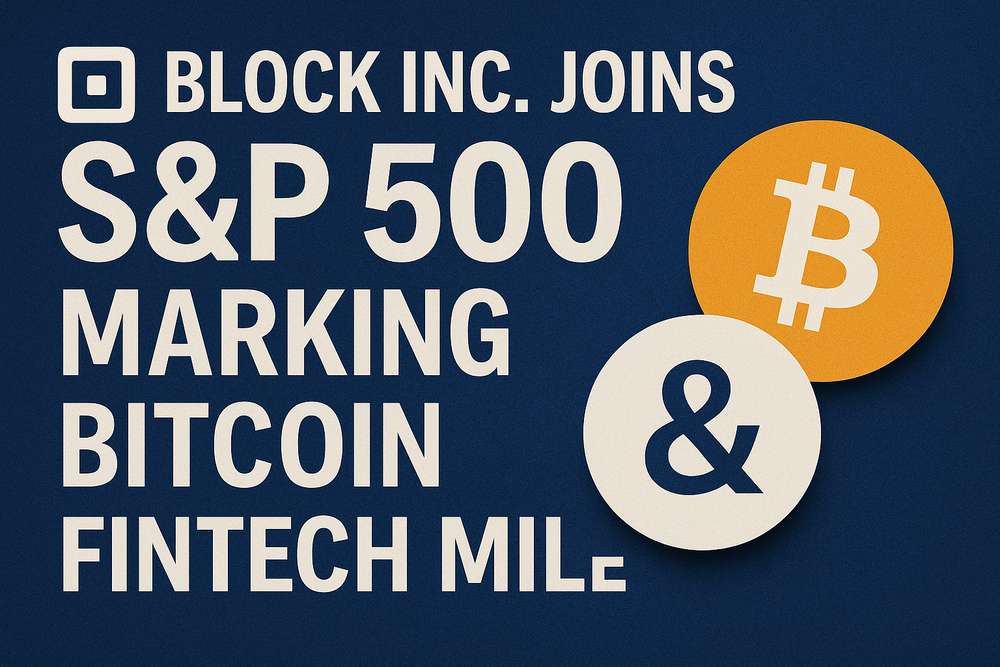Block Inc., the Jack Dorsey-led fintech agency identified for its Bitcoin integration, will be part of the S&P 500 index on July 23, 2025, changing Hess Corp. following its acquisition by Chevron. This landmark inclusion alerts rising institutional acceptance of cryptocurrency-aligned firms in mainstream finance. The announcement triggered an instantaneous 10% surge in Block’s inventory worth as index-tracking funds ready to accumulate shares.
S&P Dow Jones Indices confirmed the change takes impact earlier than market open on Wednesday, positioning Block alongside America’s company elite. The fintech firm’s journey from fee processor to diversified monetary providers supplier culminates on this milestone, reflecting its evolution right into a multi-brand ecosystem serving retailers and customers globally.
Block’s ascent represents a major validation for cryptocurrency infrastructure builders, significantly given its Bitcoin-centric merchandise like Bitkey pockets and mining providers. As reported by The Block, this growth underscores the accelerating convergence of conventional finance and digital asset innovation.
Market reactions highlighted the importance of S&P inclusion, with Robinhood Markets and Applovin Corp shares every falling roughly 1% after being handed over for the index slot. The obligatory buying by funds monitoring the S&P 500 usually creates sustained upward stress on added shares, as evidenced by Block’s double-digit share acquire.
Based in 2009 as Sq. by Dorsey and Jim McKelvey, the corporate rebranded to Block in 2021 to replicate its expanded imaginative and prescient past fee processing. Immediately, its ecosystem contains service provider instruments (Sq.), peer-to-peer funds (Money App), buy-now-pay-later providers (Afterpay), music streaming (TIDAL), and devoted Bitcoin merchandise.
Block’s Evolution to Monetary Ecosystem
The corporate’s transformation from point-of-sale {hardware} supplier to complete monetary platform accelerated with Money App’s explosive progress, which launched cryptocurrency buying and selling capabilities to tens of millions of customers. Block additional entrenched itself in regulated finance by way of Sq. Monetary Companies, its industrial financial institution subsidiary permitted for shopper lending through Money App Borrow.
This vertical integration technique enabled Block to seize a number of monetary service income streams whereas sustaining its signature deal with accessibility. The corporate’s mission to “improve entry to the worldwide financial system” now extends throughout fee processing, banking, lending, and digital asset administration.
Block’s Bitcoin advocacy stays central to its identification, with Dorsey steadily championing the cryptocurrency’s potential. The corporate holds Bitcoin on its steadiness sheet, allows BTC buying and selling by way of Money App, and develops devoted Bitcoin merchandise just like the self-custody Bitkey pockets and Proto mining providers.
S&P 500 Inclusion Mechanics
The index change follows Chevron’s accomplished acquisition of Hess Corp on July 18, creating the emptiness Block will fill. S&P 500 additions set off automated shopping for from trillions of {dollars} in index-tracking funds, creating predictable demand surges for newly added firms.
Block’s entry happens by way of the usual substitute course of when constituent firms are acquired. The timing aligns with quarterly rebalancing home windows, although distinctive company actions like main acquisitions can immediate interim adjustments.
Efficient at market open on July 23, Block will commerce underneath the ticker XYZ alongside monetary giants like JPMorgan Chase and Visa. The inclusion mandates index funds to buy roughly $11 billion value of Block shares based mostly on present market capitalization and index weighting.
Fintech and Crypto Market Implications
Block’s accession represents the primary S&P 500 entry for a corporation with substantial Bitcoin operations, signaling broader acceptance of cryptocurrency infrastructure inside conventional finance. This milestone could pave the best way for different crypto-aligned fintech companies looking for mainstream validation.
The event displays how monetary platforms mixing conventional providers with digital asset capabilities are more and more seen as integral to the financial system. Block’s journey from disruptive startup to index constituent demonstrates the maturation of fintech enterprise fashions that incorporate cryptocurrency components.
Trade analysts view this as a watershed second for cryptocurrency’s institutional legitimacy. Block’s inclusion comes amid accelerating adoption of blockchain expertise throughout conventional finance, although regulatory readability stays an ongoing problem for the sector.
Different crypto-adjacent firms like Coinbase and MicroStrategy might even see renewed investor curiosity following Block’s milestone. The occasion underscores how cryptocurrency integration has advanced from area of interest utility to aggressive benefit in monetary providers.
Set up Coin Push cell app to get worthwhile crypto alerts. Coin Push sends well timed notifications – so that you don’t miss any main market actions.
The inclusion will doubtless improve institutional publicity to Bitcoin by way of Block’s treasury holdings and product ecosystem, probably creating oblique worth assist. This growth could speed up related index concerns for different cryptocurrency-focused companies as digital belongings grow to be additional enmeshed in world finance.
- S&P 500
- A market-capitalization-weighted index of 500 main publicly traded firms within the U.S. It serves as a benchmark for the general inventory market and financial system.
- Fintech
- Monetary expertise firms that use expertise to enhance monetary actions, disrupting conventional banking and fee strategies by way of digital innovation.
- Bitcoin
- A decentralized digital foreign money working with out central authority, utilizing blockchain expertise to allow peer-to-peer transactions with cryptographic safety.
- Index Inclusion
- The method of including a inventory to a market index, triggering obligatory purchases by funds monitoring that index and usually boosting share costs.
- Market Capitalization
- The entire market worth of an organization’s excellent shares, calculated by multiplying share worth by variety of shares.
